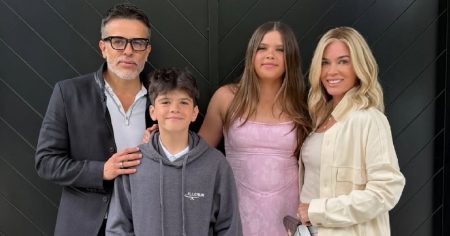Kwame Appiah, a 34-year-old alum of the Netflix reality show Love Is Blind, recently shared his journey with a newly diagnosed health condition, ulcerative colitis, a form of inflammatory bowel disease. His experience underscores the importance of proactive healthcare, heeding subtle bodily signals, and the power of support systems during challenging times. Appiah’s candid revelation on social media provides a valuable platform for raising awareness about this often-misunderstood disease and encourages others to prioritize their well-being.
Appiah’s health journey began with seemingly innocuous symptoms. In November 2024, he started feeling slightly unwell, a feeling he initially dismissed. However, his condition progressively worsened over the following weeks, culminating in three weeks of persistent fevers and a significant weight loss of 20 pounds by December. The alarming deterioration prompted a visit to the doctor, where a series of tests and examinations were conducted to determine the underlying cause. Initially, there was concern that he might have cancer, a fear that undoubtedly added significant stress to an already challenging situation. Further investigations eventually led to the diagnosis of ulcerative colitis, a chronic inflammatory bowel disease characterized by inflammation and ulcers in the lining of the large intestine.
The diagnosis of ulcerative colitis was a life-altering event for Appiah, forcing him to confront the fragility of health and reassess his lifestyle. Having previously enjoyed good health, the diagnosis came as a shock, prompting him to adapt his diet and overall lifestyle to manage the condition. This involved significant changes to his daily routine and required him to become more conscious of his dietary choices and their impact on his well-being. He embraced this responsibility with a positive mindset, viewing it as an opportunity to prioritize his health and inspire others to do the same. He emphasized the importance of proactive health management, urging people to address even minor health concerns before they escalate into more serious problems.
Appiah’s experience has instilled in him several valuable life lessons. Firstly, he gained a renewed appreciation for the simple things in life, recognizing their importance only after they were temporarily out of reach during his illness. Everyday activities that he previously took for granted became significant reminders of the preciousness of health and the ability to engage in them. Secondly, he learned the crucial lesson of not ignoring seemingly small health issues, understanding that they can potentially develop into major problems if left unaddressed. Early intervention and attention to even minor symptoms can prevent more serious health complications down the line. Thirdly, he emphasized the importance of information and knowledge in managing health conditions. He recognized that understanding the nature of his illness was essential for effectively combating it and making informed decisions about his treatment and lifestyle changes.
Appiah’s journey also highlighted the vital role of support systems during challenging times. He credits his wife, Chelsea Griffin, whom he met and married on Love Is Blind, for her unwavering support and care throughout his ordeal. Her presence and assistance were instrumental in helping him navigate the physical and emotional challenges of his illness. Griffin’s public expression of love and pride in her husband’s openness further exemplifies the power of supportive relationships in coping with health crises.
The experience has transformed Appiah’s perspective on health and life in general. He is now on the path to remission, feeling like himself again, and filled with gratitude for his recovery and the support he received. He chose to share his story publicly, not only to raise awareness about ulcerative colitis but also to inspire others to prioritize their health and well-being. His message resonates with the importance of proactive healthcare, heeding early warning signs, and seeking support from loved ones during difficult times.
Appiah’s story serves as a powerful reminder that health is a precious asset that should be cherished and protected. His willingness to share his personal health journey, including the initial anxieties, the diagnostic process, and the subsequent lifestyle adjustments, provides valuable insight into the challenges and triumphs of living with a chronic illness. His message of hope and resilience, coupled with his emphasis on proactive health management, encourages others to take control of their well-being and seek timely medical attention when needed. His story also underscores the importance of support networks and the positive impact they can have on the healing process. By sharing his experience, Appiah has transformed a personal health challenge into a platform for advocacy and awareness, inspiring others to prioritize their health and navigate their own health journeys with resilience and hope.










